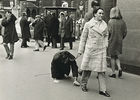EXPORT, VALIE/Peter Weibel
Biographie
VALIE EXPORT was born in Linz, Austria in 1940. After attending the Arts and Crafts College in Linz between 1956-59, she enrolled at the Design Department of the Higher Federal Teaching and Research Institute of the Textile Industry in Vienna, from 1960-64. In 1967, she decided on the name VALIE EXPORT as an artistic concept and logo. She was co-founder, in 1967, of the Austrian Filmmakers’ Cooperative in Vienna, and took part in many important international exhibitions, among them the Documenta 6 in 1977 and the Biennale di Venezia, in 1978 and 1980 for the Austrian Pavillion. VALIE EXPORT taught at numerous international institutions, including the University of Wisconsin, Milwaukee, USA, and the University of the Arts, in Berlin. 1995/96 until 2005 she was professor for Multimedia-Performance at the Media Art Academy in Cologne. In 1995 the artist was awarded the Generali Foundation’s prize for sculptural works and in 2000 she became the recipient of the Oskar Kokoschka prize. VALIE EXPORT lives in Vienna. Peter Weibel was born in Odessa/Ukraine in 1944. He studied literature, medicine, logics, philosophy, and film in Paris and Vienna. From 1992 until 1995 was Peter Weibel artistic director of the Ars Electronica. 1992 until 2011 he was chief curator at the Neue Galerie in Graz. From 1993 until 1999 he curated the Austrian Pavilion for the Venice Biennials. 2008 he curated the International Biennial of Seville and 2011 the 4th Moscow Biennale. He was awarded the Generali Foundation’s sculpture prize (1991), the Siemens media art prize (1997), the Käthe-Kollwitz-Prize (2004) and the European Culture-Project-Prize of the European Culture Foundation (2009). Peter Weibel taught at numerous international institutions including the University of Applied Arts, Vienna, the College of Art and Design in Halifax, Canada and the Comprehensive University in Kassel. He was Associate Professor for Video and Digital Arts at the Center for Media Study of the State University of New York in Buffalo, N. Y for five years. Currently he is director and member of the board of directors of the Center for Art and Media Technology (ZKM) in Karlsruhe, Germany, where he lives since 1999.
Additional biography
VALIE EXPORT and Peter Weibel collaborated in the late 1960s and in the 1970s, particularly in the area of "Expanded Cinema" and on several spectacular actions or happenings. In their shared work, EXPORT and Weibel subjected the social interrelations of an existence lived in the media to a radical investigation. In the process, they exposed both the principles inherent in film and the way in which these are linked to political mechanisms and communication techniques. As co-founders of an organization called the "multi media group", in 1969 they organized "Publikum als Ausstellung," an early performance, which for the first time employed video as a new medium. In their "Expanded Cinema" works they combined an analysis of the cinematic medium with a process of opening it up and questioning it with a number of happening-like elements. Peter Weibel appeared as the main protagonist in EXPORT’s "Cutting" (1967-68), and authored the script for EXPORT’s feature film "Unsichtbare Gegner" ("Invisible Adversaries") (1976-77). With the photographic documentation from "Aus der Mappe der Hundigkeit" (1969), the Generali Foundation owns one of the central works of Austrian art history. In "Das Magische Auge" ("electronic ray tube," 1969), EXPORT and Weibel employed technical wizardry in such a way as to cause fluctuations of the light to be expressed as fluctuations of sound, resulting in a situation at the projection whereby a unique sound-collage was produced on each occasion. In 1969, EXPORT and Weibel went on an "Artwar Campaign" through Germany and Switzerland, using aggressive infringements of taboos as a way of declaring war on what they saw as the public’s passive voyeurism and firmly-entrenched normative conduct. However, the tactics applied, such as public floggings and the throwing of barbed-wire balls, led to a major uproar in a hall in the city of Essen, where EXPORT suffered an "artwar" injury, leading in the end to a ban on further performances. Under the title of "Bildkompendium Wiener Aktionismus und Film," the two artists published an important photographic documentation of these currents in 1970, which led to court appearances for both on charges of infringements against the anti-pornography law. (Monika Vykoukal)
